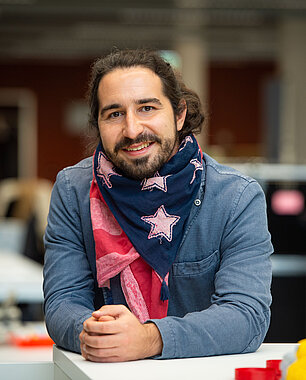 © Klaus Pichler/ÖAW
© Klaus Pichler/ÖAW
- Location advantages
- Innovation and digitalisation
- Research & development
- News
Quantum leaps: Austria as a hotspot for research
03. December 2024Whether for quantum computers or secure data transmission, the further development of the future field of quantum-based information and communication technology (ICT) will only succeed on the basis of excellent research. In Austria, researchers can leverage the benefits of an innovative location, renowned research institutions, high international standards and extensive funding opportunities.
Pioneers such as Erwin Schrödinger and Nobel Prize winner Anton Zeilinger have fuelled quantum research in Austria and succeeded in attracting international talents. One example of this is the scientific talent Richard Küng. The 36-year-old quantum computer scientist studied and conducted research at top universities in Australia, Germany, England, the USA and Switzerland. He turned down offers from Google, Amazon and the like. This is because he secured a coveted tenure track position in his native Austria, which offers scientists a permanent professorship after successfully proving themselves. The chances of being promoted to a permanent position are significantly higher here, for example, than in the Anglo-American countries.
Outstanding research centre
Richard Küng's success speaks for itself. He now serves as Professor of Computing Technologies at the Johannes Kepler University Linz Johannes Kepler University Linz ()and a member of the Young Academy of Sciences. Thanks to funding such as the Austrian Science Fund (ASF) START Award and a highly competitive Starting Grant from the European Research Council (ERC), he is pressing ahead with research into algorithms for quantum computers and expanding his research group. He is looking for efficient solutions to algorithmic challenges that could be used to process quantum and classical data, amongst other applications.
"Quantum computers will completely change science and research thanks to their computing power. Austria is particularly strong in quantum research and can keep up with players from America and Asia. In the race for this key technology, I think it is important that our democratic values are also incorporated," says Richard Küng.
Supercomputer as a research booster
On the basis of its project “Multi-Site Computer Austria,” in short MUSICA, Austria is creating three networked high-performance computer systems and thus new opportunities for ambitious research.
The distribution of computing power between Vienna, Linz and Innsbruck enables increased resilience and flexible utilisation. The system in Vienna will switch from test to regular operation starting in January 2025. Subsequently the other sites will follow. MUSICA is one of the most powerful systems in the world, featuring a total computing power of 40 petaflops, around eight times more than the previous state-of-the-art computers in Austria. The project is being funded to the amount of € 36 million by the NextGenerationEU Recovery and Resilience Facility and the Austrian Federal Ministry of Education, Science and Research.
From scientific excellence to space technology
Since the summer of 2023, various Austrian research institutions have been working closely together in the Quantum Science Austria (quantA)Quantum Science Austria (quantA) () Cluster of Excellence on key issues relating to the quantum nature of space, time and gravity. This cluster encompasses more than 60 research groups, for example from the Austrian Academy of Sciences (AAS), the Institute of Science and Technology Austria (ISTA), the Vienna University of Technology, the University of Innsbruck and the University of Vienna. Its mission is to consolidate and expand the leading role of Austrian quantum science. One focal point is quantum information. In this case, researchers are investigating how physical systems process this information, where their strengths lie and where there challenges still exist.
Read more about quantum technologies in AustriaRead more about quantum technologies in Austria ()
